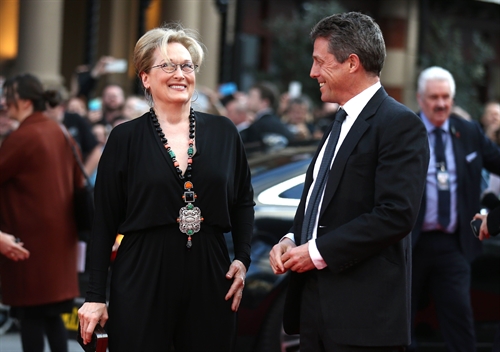 Life & Style
Life & Style

When opera lovers ask New York’s Carnegie Hall for souvenir concert programmes, they’re not usually interested in Maria Callas or Joan Sutherland. More often than not, the name they request is Florence Foster Jenkins, an American socialite who only appeared at the legendary venue once, and couldn’t hold a note.
 |
| This file photo taken on April 12, 2016 shows US actress Meryl Streep (L) and British actor Hugh Grant as they arrive for the premiere of Florence Foster Jenkins in London.—AFP/VNA Photo |
LOS ANGELES — When opera lovers ask New York’s Carnegie Hall for souvenir concert programmes, they’re not usually interested in Maria Callas or Joan Sutherland. More often than not, the name they request is Florence Foster Jenkins, an American socialite who only appeared at the legendary venue once, and couldn’t hold a note.
"In order for a singer to succeed, they need to have a combination of talent, charisma, and interpretive quality," Carnegie’s archives director Gino Francesconi wrote in a blogpost commemorating her life.
"And, by definition, they need to be able to sing. Florence Foster Jenkins had none of these attributes. In fact, she was considered one of the worst singers of all time."
Jenkins, who craved fame as a diva but gained infamy for her terrible voice, is the subject of Florence Foster Jenkins, a bittersweet biopic which hits US theatres this week, starring three-time Oscar winner Meryl Streep and Hugh Grant.
"She almost gets it, and that’s what I found delicious in her," Streep told the audience at a preview screening for the Paramount picture in Beverly Hills last week.
"I started listening to the recordings and I could feel her getting really excited and her thinking ’This is going very well,’" said the actress.
Jenkins, who inherited a fortune from her father in 1909, had to give up her beloved piano due to nerve damage from syphilis contracted from her first husband when she was just a teenager.
She used her wealth to indulge her passion for opera singing instead, putting on grand artistic soirees for polite society at the Ritz-Carlton, the Waldorf and other upscale Manhattan venues.
’Vanity’
Those who heard her — often acquaintances rather than paying members of the public — knew she was a terrible singer but none ever felt inclined to tell her.
"It became a thing to do. You had to go and listen to Florence Foster screw up every song she attempted to sing," says Francesconi.
She was persuaded to make her Carnegie Hall debut at the age of 76 on October 25, 1944 and walked onstage in flamboyant homemade costumes, throwing roses into the sell-out crowd.
The concert went as poorly as had every other recital, but this time Jenkins was not among friends.
Henry Simon of the daily newspaper PM described the audience’s laughter as "the cruellest and least civilised behavior I have ever witnessed in Carnegie Hall”.
But a less charitable write-up in the Los Angeles Times described the performance as the "most pathetic exhibition of vanity I have ever seen".
The singer’s common-law husband, failed Shakespearean actor St. Clair Bayfield hadn’t approved of the concert, and wrote after her death that it had "turned out the fiasco I expected”.
"Afterward, when we went home, Florence was upset — and when she read the reviews, crushed. She had not known, you see," he added.
Diagnosed with heart strain, she died a month later.
Directed by Stephen Frears (Philomena, The Queen), the movie was shot in London and Liverpool, a city in northwestern England whose architecture is said to resemble that of 1940s Manhattan.
’Funny and moving’
"I thought it was a very special kind of gift, an adventure, to look into the life of someone who had no understanding of how she presented, except to hope that it went well," said Streep, 67.
Grant — whose acting had taken a back seat to campaigning in Britain for tighter regulation of the country’s famously rowdy tabloid press — was in semi-retirement, "having a baby a week, basically," when he was asked to play Bayfield.
"Stephen, who I knew a bit through the politics, started to make noises about a film. I thought he was joking and then suddenly this script appeared on my desk from him," said the actor, who has fathered four children since turning 50.
"Not only was it funny and moving, but it was also directed by him — he’s quite classy — and Meryl bloody Streep was going to be in it so I absolutely had to say yes."
Grant spent a year researching Bayfield’s diaries and letters, and believes the historical figure may have been more straightforward, and less bright, than the character he ended up portraying.
"The appeal of the film to me, and I think maybe to Stephen Frears as well, is that lots of things within it don’t fit into normal boxes," the 55-year-old Briton said.
"So you can’t decide if Bayfield’s a goodie or a baddie and, equally, you can’t quite decide are we laughing with these people or at them. I would say that in the end, having teased the audience like that, hopefully we realise we’re with them."
Florence Foster Jenkins hits US theatres on Friday.—AFP